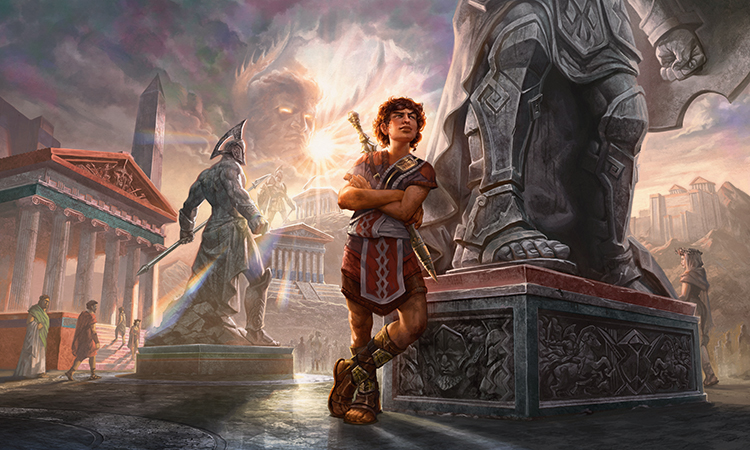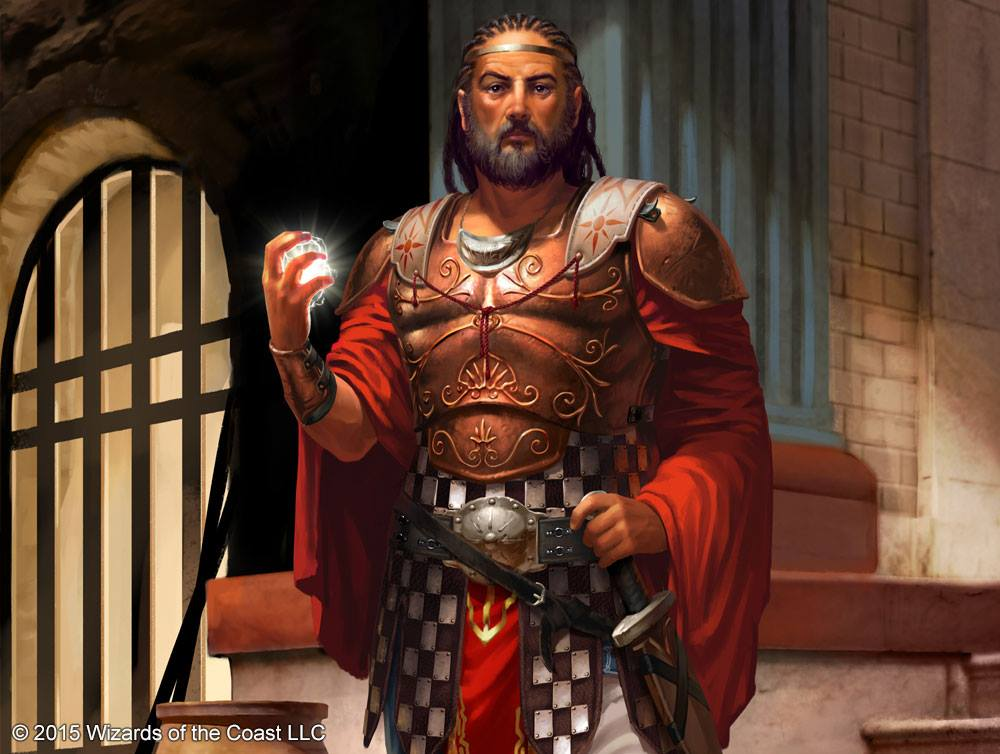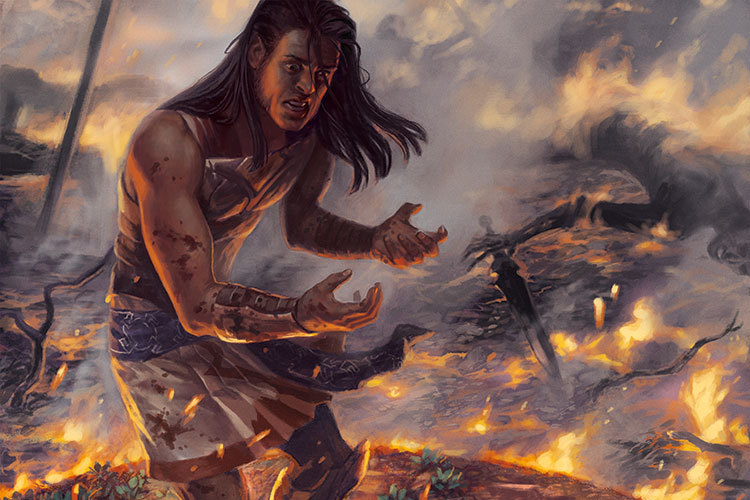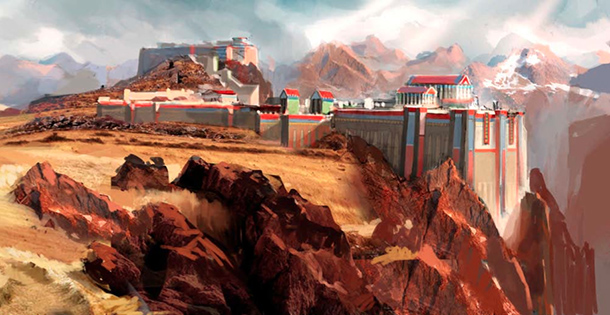Gideon Jura was a hero like no other. We saw it on Ravnica:
“Gideon Jura.” Her voice was powerful with an otherworldly quality. “Your accent, dress, and even your name say you’re not from this district. And yet . . . I have word that you saved an entire brigade of my Boros from a Rakdos ambush that would have killed every last one of them.”
Jace’s illusions, semi-substantial, tried to crowd the beast, buying him more time, until . . .
. . . a flash of light, the sound of a whipping blade and tearing flesh. The horror dropped into a mangled, whimpering pile. Gideon.
“It’s fine, Jace. I’ve got your back.”
A blink of an eye. One moment, a formidable Consulate charger raced down the street. The next, a heap of scrap laid spread out before Gideon and the very dazed-looking pilot still cocooned in his arms.
“You can probably call it a day.” Gideon set the pilot down and clapped a friendly hand his shoulder.
And during the War of the Spark:
From an inch away (or maybe a world away), Liliana saw Gideon smile beatifically–before his smile, his teeth, his skin, his eyes, his entire handsome, kind, muscular face began to glow with the hellish light of her tattoos, of her broken contract.
No, she pleaded, as the blaze expanded, as if attempting to burn her arm–her arm, which could not be burned thanks to Gideon’s gift.
Take it back . . . Please . . .
The smile was still there. Right up to the moment that he burst into black flame and disintegrated before her eyes.
Gideon Jura is dead. In his final hours, he did the impossible: rallied an army of Planeswalkers and Plane-bound, defied a being of legendary power and cruelty, and laid down his life to save another. Perhaps that was a normal day for him. After a lifetime of heroism and selfless sacrifice, Gideon Jura is gone; and the entire Multiverse must find some way to spin on without him.
Gideon was my favorite character in the Magic Story. Some may be surprised to hear this, because Gideon is not very dynamic; he has encouraged development in other characters, but has mostly been the same person since the story’s beginning. It’s easy to see Gideon as Captain America or Superman: an important symbol of goodness, but not much of a personality. Even some of the authors of the Magic Story seem to have written off Gideon as a generic, do-gooder action hero. All of them are wrong. Gideon was a hero, but he was more than that. He was a jock, someone who didn’t realize his own strength and force of personality. He was kind, someone who saw the best in everyone around him. And he was a tragic figure: a man who allowed a single mistake to control his entire life.
In this article series, I want to explore who Gideon truly was: the man, not the myth. To understand him, we’ll need to start on Theros.
Kytheon Iora, Son of Akros
In a Red/White city, dedicated to a Red/White god, there lived a Mono-White boy named Kytheon Iora. Or so we’re told. In truth, there seems to be more Red than White in the thirteen-year-old Kytheon. Let’s take a moment to look at his résumé.
Kytheon has a casual contempt for authority figures. As the story begins, we find him on his first day in an Akroan prison, arrested for stealing food and money. Kytheon tried to escape as they dragged him off; he will attempt another half-dozen escapes before his term is up. Upon learning that a man named Ristos, a gang-leader, is the true power in the prison, Kytheon can’t wait to defy him. Kytheon is rude and dismissive to the prison warden and refuses to accept that anyone has power over him. And though we are not told why, it’s mentioned that Kytheon was thrown out of the Akroan army when he was younger, which suggests that rebellion has been a lifelong hobby.
Kytheon is a fighter. More accurately, a brawler. He did not train as one of Akros’s disciplined hoplites, but grew up on the mean streets of the Foreigners’ Quarter. He fights on instinct, intuitively knowing where to strike and when. Kytheon loves physical combat, and eagerly seeks it out: practically the first thing he does in prison is pick a fight with seven hardened thugs.
It wasn’t long before guards pushed their way through the throngs of prisoners, but Kytheon didn’t need long. By the time the guards arrived, they found Kytheon, bloody-faced and bloody-fisted, pummeling the last of Ristos’s men.
When the thirteen-year-old kid saw the guards descending on him, he slumped to the floor, spent, exhausted, and utterly satisfied.
Kytheon is magnetic and inspiring. Even at the age of thirteen, he has developed a reputation throughout the city. He has drawn together a band of young fighters, dubbed Kytheon’s Irregulars. They are intensely loyal to him, personally, to the point of outright fanaticism. Even after four years of separation, they do not hesitate to charge out and confront three rampaging cyclops unsupported, or hunt down the spiteful titan of a death god. He’s a natural leader, of a caliber greater than any other character in the Magic Story. Those around him have an unshakable faith in his ability to carry the day.
And yet, despite his obvious personal charm, Kytheon puts little stock in the opinions of others:
“Ristos?” Kytheon couldn’t help but laugh. “My mother called people like him weak because their strength comes from how others see them. ‘Strength comes from action,’ she said. Ristos is weak. I saw it right away. Now everyone else here knows it too.”
Strength comes from action, not from others’ perceptions of you. How fitting. Loud, brash, rebellious, impulsive, charismatic, and physical, young Kytheon hits the entire Red checklist. He and Chandra would have gotten along like a house on fire if they met at this point. And yet, there is White in him still, if you care to search it out.

Kytheon is not a killer. After the brawl, he is dragged before Hixus, the prison warden. Hixus isn’t getting anywhere with him, so he chooses the dramatic approach: he tosses the keys to Kytheon’s cell on the table along with a dagger, and says Kytheon is free to leave as long as he slits Hixus’s throat. A single murder in return for his freedom.
Pride swelled in Kytheon. He always liked to fight. He was good at it.
Kytheon pointed the dagger at the warden for a long moment. Neither averted his gaze from the other.
“I’m not going to kill you,” Kytheon finally said. He dropped his arm to his side, letting the dagger clatter to the floor.
His Red side then takes over, and Kytheon turns his refusal into defiance against Hixus’s authority. But the fact remains: Kytheon may love to fight, and he may be great at it, but he has no desire to kill anyone. That cold ruthlessness is foreign to him.
Kytheon wants everyone to be treated fairly. He doesn’t like seeing people get pushed around. He and his Irregulars claimed the Foreign Quarter as territory but never tried to control or exploit the people who lived there. He attacks Ristos’s men when he sees them extorting bread from the other prisoners. While he gets hauled off by the guards, one of his Irregulars starts a prison riot to depose Ristos once and for all. Kytheon preyed on bullies without becoming one himself.
Kytheon always tried to do the right thing, but his idea of right and wrong did not come from secular laws or divine commandments. His internal sense of fairness and justice guided his actions. He stole food not to feed himself, but to feed his friends and their families—breaking the law to further a greater purpose.
If there’s a better definition of Red/White than that, I haven’t heard it. Kytheon uses Red means and methods to achieve White goals. I contend that both colors are inherent to his being, down to his very bones, and a necessary part of his emotional health. To deny one or the other would be to forfeit any semblance of inner peace. So what happened? How did the Boros young Kytheon turn in to Gideon Jura, the literal poster child for Mono-White? What happened to his vital, precious, joyful Red heart?
It was killed. It was cut out and buried, by three events in quick succession.

The first was Hixus’s training. Though he tried to refuse it, Hixus gave him little choice in the matter. Every day for the next few years, Hixus would strengthen his mind and body, teaching him how to use Hieromancy, the defensive magic of action and reaction. It added a layer of thoughtful White analysis to his intuitive battle insight. Even within this single origin story, we see his Red instincts begin to take a backseat:
“Trust me,” Kytheon said, running toward the gate. He understood Zenon’s hesitation; only a few years ago his face would have held the same baffled expression, or more likely he would have charged at the straining wall without so much as a thought. But, this was not a few years ago. Adapt, turn the situation to my advantage, ensure victory.
After four years of training, disaster strikes. An enormous host of harpies descends upon the city, and all hands are needed to defend Akros. Hixus opens his prison and promises freedom to anyone who will stand with the city’s defenders; and Kytheon, now a young man, is the first to volunteer. While the Warden and the other prisoners distract the harpies, Kytheon rallies his Irregulars and defeats the cyclops battering down Akros’s gates. With the polis saved, Kytheon watches the sun rise over Akros as a free man.
The events of that fateful day will haunt Gideon for decades to come:
His eyes were drawn to a flock of Consulate thopters approaching the upper platforms of the Aether Hub, wheeling and circling like . . .
The next breath came in tight, lightheaded, like the last one before your head sinks underwater.
. . . like harpies over Akros.
“Get back to the Hub!” he shouted, breaking into a run. “Double time!”

The second was a tragedy of arrogance. Kytheon’s heroic defense attracted attention far and wide, from mortal and immortal alike. Heliod, God of the Sun, was watching, and decided to give Kytheon an opportunity to earn his favor: kill a titan of Erebos that was drawing near Akros in pursuit of souls who had escaped from the Underworld.
Gideon accepts, and he and his Irregulars make short work of the titan. Erebos, God of the Dead, is there to watch his servant die; and Gideon, in a moment of thoughtless bravado, hurls the Spear of Heliod directly at him. Erebos casually sends it back, and Gideon takes it square in the chest, his Irregulars falling in behind him. There’s a flash of light, impossibly bright, and then:
Color slowly seeped back into his surroundings. He looked down, inspecting where the spear made contact. No damage, but he noticed flecks of red. He moved a hand to wipe them, and saw that the back of it was splattered red too—both hands were. But if it wasn’t his blood . . . .
No.
He whirled around.
His eyes passed over four lifeless bodies.
No.
This moment is the most important in Gideon Jura’s life, and will dominate his actions and mentality to the end of his days. Gideon’s spear, thrown by his own hand, was the weapon that slayed his family. In a Red instant of pure impulse and hubris, Kytheon Iora lost everything he had—and gained something new. The experience proved so traumatic, it kindled Kytheon’s spark, and he planeswalked away.
The third was his time on Bant, the plane he was drawn to. He will be found by a patrol of knights, and given a new name:
As the knight spoke, Kytheon noticed she was not alone. A handful of other knights had formed up behind their captain. “What is your name, wanderer?”
“Kytheon,” Kytheon choked out.
“Gideon?” Moukir attempted to confirm.
Before he could correct the knight, Kytheon was overcome by a wave of serenity that suddenly welled up inside of him.
Kytheon will look up and see an angel for the first time.
In that moment, Kytheon knew that he had left Theros, his home, behind. His Irregulars were gone—a pain he brought with him. His ordeal had only begun.
Later in life, Gideon would always explain the name change as something incidental—a minor concession to the people of Bant, who had trouble pronouncing his name. I think it is far more likely that a broken, grieving Kytheon leapt at the opportunity to reinvent himself and leave his harrowing mistake behind him. If Hixus tempered Gideon’s Red side, and his mistake murdered it, then Gideon’s time on Bant must have entombed it six feet under.
Bant is a plane consisting mostly of White mana, with a smaller portion from White’s allies, Blue and Green. There is no chaos on Bant, only structure and order. There is no impetuousness on Bant, but reflection and measured discussion. There are no tempestuous emotions, or the chaos they bring: Bant has room only for consideration, growth, and service. There could be no better place for Gideon to sever this part of himself, to lay on Theros with the bodies of his friends forever.
But I’m afraid to say it won’t work: Gideon’s ordeal truly has just begun. Join me next week for an overview of Gideon’s time on Ravnica, where we will see his White side spiral out of control until it begins to consume him entirely.
David Walley is only a recent fan of Magic: The Gathering, but a lifelong spectator to stories. After discovering the Magic Story earlier this year, he was greatly impressed by both its strength and subtlety. In his articles, he endeavors to expand the Vorthos community by showcasing the story’s excellence to the average Magic fan.


